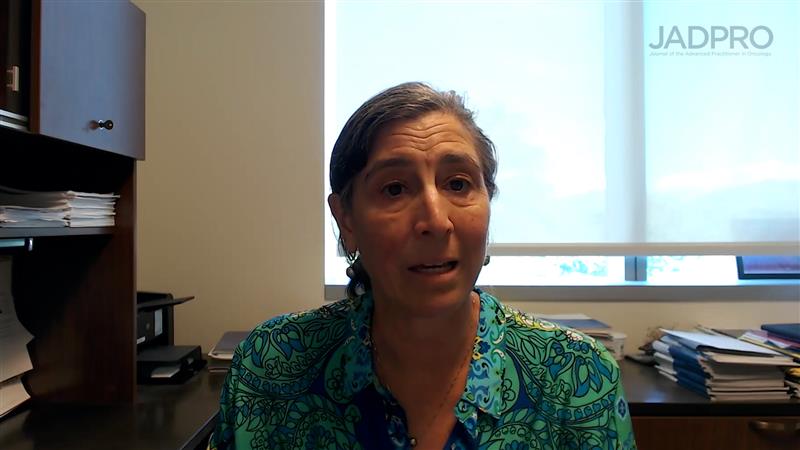Transcript
Aloha. My name is Christa Braun-Inglis. I'm a nurse practitioner and associate researcher at the University of Hawaii Cancer Center. My clinical practice is in breast medical oncology at Hawaii Pacific Health. I'm here today to discuss additional findings from the INAVO120 study presented at the recent ASCO meeting.
Almost 40% of metastatic breast cancer patients who are hormone receptor-positive, HER2-negative harbor a PIK3CA mutation. PIK3CA mutations increase cancer growth and have negative impacts on prognosis. Targeting CDK4, ER, and PI3 kinase pathways has the ability to enhance responses, but prior to inavolisib, combinations have been found to be much too toxic. The INAVO120 is a Phase III study for patients who harbor PIK3CA mutations and had progressed on endocrine therapy, such as an aromatase inhibitor or tamoxifen, or who had recurred within 12 months of stopping endocrine therapy. Inavolisib was approved in 2024 to use in combination with palbociclib and fulvestrant, based on the primary outcome of progression-free survival from the INAVO120 study.
This analysis presented at this year's ASCO looked at both overall survival and toxicity from the INAVO120 study. Key outcomes I want to discuss is that the inavolisib, palbociclib, and fulvestrant significantly improved overall survival as compared with palbociclib, fulvestrant, and placebo. The median improvement in overall survival was found to be seven months, increasing from 27 months in the control arm to 34 months in the study arm. This is the first time overall survival has seen to be significantly improved with a PI3 kinase-targeted drug. In addition, the previously seen progression-free survival also maintained during this follow-up.
Another really important endpoint for this analysis was time to initiation of chemotherapy, which was significantly improved with a delay in two years. I know this is really important for me because I really try to keep this cohort of patients off chemotherapy for as long as possible. Key toxicities for advanced practitioners to watch out for are hyperglycemia, mouth sores, and diarrhea, both related to mucosal inflammation, and dry eyes and blurry vision. All of these toxicities were reported at a higher rate in the inavolisib group as compared to the study group. Good news, adverse events were manageable and only resulted in a low discontinuation rate of 6.8%.
Advanced practitioners working with metastatic breast cancer patients should be aware of how different somatic mutations can affect treatment decisions and the prognosis of their patients. This triplet therapy is designed for a very specific endocrine-restraint PIK3CA mutated population. But it's actually a very exciting option for these patients, because, first of all, we had the progression-free survival benefit, but now we have the overall survival benefit and we found it to be well tolerated.









